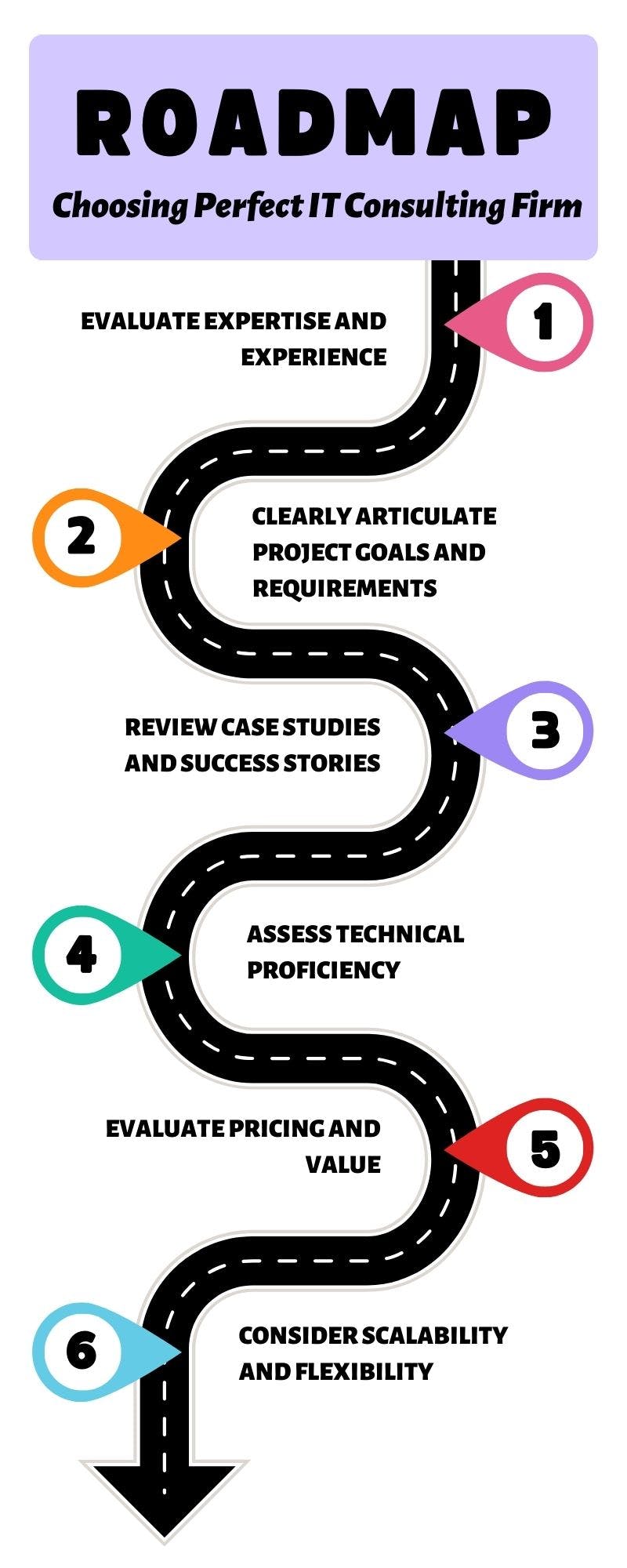When it comes to the future of the digital business landscape, harnessing the power of technology is essential for success. This is further accentuated by the projected growth of the IT Consulting and implementation market, with revenue surpassing US$67.82 billion in 2023 and an expected CAGR of 5.11%, resulting in a market volume of US$87.03 billion by 2028.
Whether undertaking a new project or enhancing your existing IT infrastructure, partnering with a firm with visionary solutions can make all the difference. However, selecting an ideal IT consulting firm involves careful consideration of various factors to ensure a seamless collaboration that aligns with your project goals and overall business objectives.
This ultimate guide will walk you through a structured roadmap to help you make an educated decision when selecting the perfect IT consulting partner.
The Roadmap: Choosing the Perfect IT Consulting Firm

Evaluate Expertise and Experience
Expertise and experience are two key factors that define a reliable IT consulting firm. Thus, it becomes necessary to assess the firm's track record in delivering solutions similar to your project. You must look for industry-specific expertise and a proven ability to tackle challenges identical to those you may encounter. Remember, a firm with a robust portfolio of successful projects is more likely to bring valuable insights and innovative solutions.
Clearly Articulate Project Goals and Requirements
The foundation of any successful collaboration begins with a clear understanding of your project goals, objectives, and specific requirements. Therefore, you must clearly articulate the scope of your project, desired outcomes, and any unique challenges you anticipate. This initial step will guide you throughout the selection process, helping you align with an IT consulting firm with the expertise and capabilities crucial to your project's success.
Review Case Studies and Success Stories
Case studies and success stories provide real-world insights into how an IT consulting firm has addressed challenges and delivered tangible results. Scrutinize case studies that align with your industry and project requirements. Also, pay attention to the complexity of the challenges faced and how the firm's solutions contributed to the client's success. This step offers a practical understanding of what you can expect from the consulting firm in real-world scenarios.
Taking Action: Making an Informed Decision
To sum up, it is necessary to evaluate each firm thoroughly based on expertise, experience, technical proficiency, cultural fit, communication, scalability, and pricing. Besides, you must always ensure that you take appropriate time to decide which firm to choose for your IT consulting services. By actively following this roadmap, you can confidently select the perfect IT consulting firm for your projects
Remember, the right IT consulting firm will provide technical expertise and act as a strategic partner, helping you achieve your business goals and navigate the complexities of the digital landscape. When you have the perfect guide by your side, you can comfortably start your IT business. They will help you ensure that your business is well-equipped to reach the heights you want it to propel.
Good Luck!
FAQs: Addressing Common Concerns
Ques 1: How do I choose an IT consultant?
Ans: Follow a structured process that involves defining your needs, evaluating potential firms, conducting thorough research, and negotiating favorable terms.
Ques 2: What should I look for in an IT consultant?
Ans: Seek consultants with proven experience, industry expertise, strong communication skills, a collaborative approach, and a culture that aligns with your organization.
Ques 3: How much does IT consulting cost?
Ans: IT consulting costs vary depending on the scope of work, project complexity, and consultants' experience level. Get quotes from multiple firms to compare pricing.
Ques 4: What are the benefits of IT consulting?
Ans: IT consulting offers numerous benefits, including enhanced expertise, objective perspectives, cost-effectiveness, scalability, and risk mitigation.
